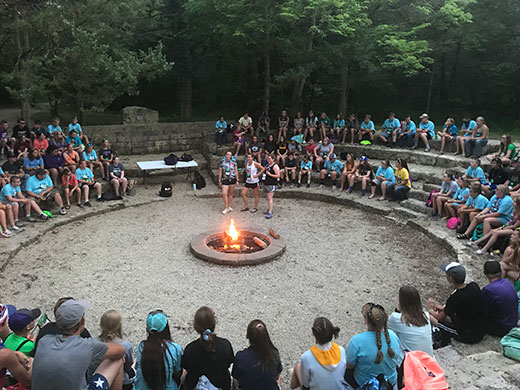
Youth sit around a campfire during a previous year's event at the Rock Springs 4-H Center. While the global pandemic precludes having in-person events this summer, the learning will go on for Kansas 4-H members.| Download this photo.
4-H Campference to offer learning opportunities for youth
Registration deadline quickly approaching
June 10, 2020
MANHATTAN, Kan. – Pandemic or not, Beth Hinshaw says the learning will go on for Kansas 4-H members this summer.
So, she’s helped guide the Kansas 4-H Youth Council as they’ve made plans for the annual 4-H Campference which – like many events the past three months – will be held online.
Registration costs $20 and will close this Friday, June 12 for the event, which is scheduled for June 23-24 and designed to expose youth ages 12-14 to professional development learning opportunities, much like they might have in a future career.
Listen to an interview by Jeff Wichman with Beth Hinshaw during the 4-H segment of the program, Agriculture Today
Normally, the youth gather at the Rock Springs 4-H Center south of Junction City, but with limitations in place due to the current pandemic, Campference will be online only.
“Campference has always been a really great blend of the fun of 4-H camp, and helping these 12 to 14 year olds transition some of that fun into leadership and other type of learning,” said Hinshaw, the 4-H youth development specialist in the southeast region.
Instead of stretching learning over four days, Hinshaw said this year’s 4-H Campference will focus lessons on two days:
- Tuesday, June 23 – There will be a 1 ½ hour session in the afternoon, and a two hour session in the evening.
- Wednesday, June 24 – There will be a two hour session in the morning, and two hour session in the afternoon.
“We know that people only have so much attention span, even if we’re doing all sorts of fun things,” Hinshaw said. “You have to be realistic about how long people can be on a device and what makes sense.”
In addition to learning activities, Hinshaw promises creative ways of incorporating such fun activities as line dance lessons, a talent show, ‘Camp Craft,’ and making s’mores – which, she says, “will be real.”
“I mention those fun things we are going to do, but one of the ways we are pushing youth into leadership and learning is we will have a community conversation, and then we have a partnership with the Kansas 4-H Foundation to learn more about philanthropy, as well,” Hinshaw said.
“We think we have a really well-rounded program offering the fun of camp and some really great learning opportunities to take young people forward.”
Registration is available at www.Kansas4-H.org. A limited number of spots are available, so interested persons are encouraged to register right away.
“We sure hope that young people will consider signing up,” Hinshaw said. “The nice thing about this is not only are you going to see kids from your own 4-H club or your own county or district, but you are going to meet others from across the state as well.”

